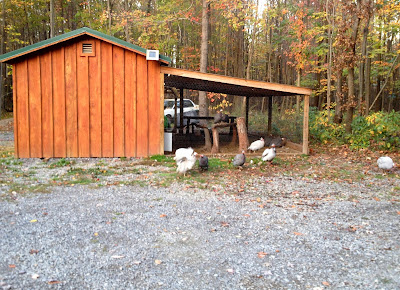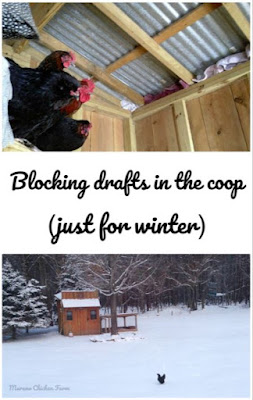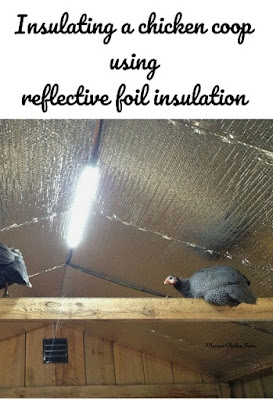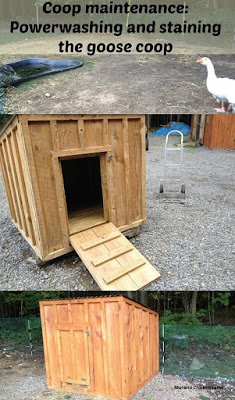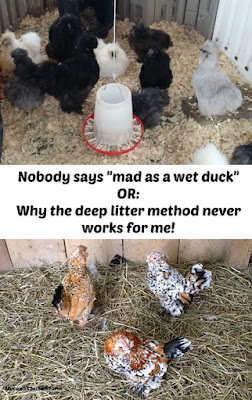Today we have about 3" of frozen snow (when it rains on top of snow, then freezes and snows again. Yeah, that mess!) and it's only 11 degrees this morning! Yuck! The chickens hate it, I hate it...and now I'm playing catch-up and getting the coops winterized and the chickens ready for the cold. So come along and join us while we chip ice, insulate, re-group and get ready for winter!
Showing posts with label coop maintenance. Show all posts
Showing posts with label coop maintenance. Show all posts
Getting your backyard chickens ready for winter
I really hope getting your chicken coop prepped for winter isn't an issue for you! If it isn't....that means you live somewhere warm. That sounds so nice. Here in western Pennsylvania it snows a good deal. I also get what they call "lake effect snow" because of the moisture in the air over lake Erie. Even my friends down in Pittsburgh have it easier then I do, so getting the whole chicken farm prepped for winter is essential!
Today we have about 3" of frozen snow (when it rains on top of snow, then freezes and snows again. Yeah, that mess!) and it's only 11 degrees this morning! Yuck! The chickens hate it, I hate it...and now I'm playing catch-up and getting the coops winterized and the chickens ready for the cold. So come along and join us while we chip ice, insulate, re-group and get ready for winter!
Today we have about 3" of frozen snow (when it rains on top of snow, then freezes and snows again. Yeah, that mess!) and it's only 11 degrees this morning! Yuck! The chickens hate it, I hate it...and now I'm playing catch-up and getting the coops winterized and the chickens ready for the cold. So come along and join us while we chip ice, insulate, re-group and get ready for winter!
Chore schedule for my day 'off'
Today I had the day off. By off I mean I didn't have to go to the place that gives me a paycheck. So on my day off I would like to relax but unfortunately, I'm a chicken farmer and farmer's never truly get a day 'off'. We have chores every day of the week. There's always some animal that needs fed or cleaned up after. Thankfully my daily chicken chores are pretty easy.
It takes about 1/2 hour every morning to feed/water the chickens, switch out dirty bowls and let everyone out. In the evening it takes about another 1/2 hour to feed/water & count every bird then lock them all up for the night. Usually youngest son does afternoon feeding so I get to sit that one out. When I find some time during the week I scrape poop boards and fill feed bins. I clean out brooders at least twice a week. It only takes a few minutes here and there. Nobody really wants to come home from work and start cleaning coops, so the big cleaning comes on the weekend.
Morning chores: 1/2 hour (feed, water & open doors)
Met with customers, gave farm tour: 1 hour
Moved chicks out of Silkie coop to grow-out pen, fixed led light in silkie coop: 1/2 hour
Cleaned Guinea coop (20X12 building): 1 hour
Chased Guineas back into coop: 15 minutes
Washed food and water bowls that have accumulated all week: 1/2 hour
Cleaned out the brooders in the garage: 15 minutes
Evening chores: 1/2 hour (fill waters, lock up & count them all)
It takes about 1/2 hour every morning to feed/water the chickens, switch out dirty bowls and let everyone out. In the evening it takes about another 1/2 hour to feed/water & count every bird then lock them all up for the night. Usually youngest son does afternoon feeding so I get to sit that one out. When I find some time during the week I scrape poop boards and fill feed bins. I clean out brooders at least twice a week. It only takes a few minutes here and there. Nobody really wants to come home from work and start cleaning coops, so the big cleaning comes on the weekend.
Chicken farm chores
This is what I did on my day off:Morning chores: 1/2 hour (feed, water & open doors)
Met with customers, gave farm tour: 1 hour
Moved chicks out of Silkie coop to grow-out pen, fixed led light in silkie coop: 1/2 hour
Cleaned Guinea coop (20X12 building): 1 hour
Chased Guineas back into coop: 15 minutes
Washed food and water bowls that have accumulated all week: 1/2 hour
Cleaned out the brooders in the garage: 15 minutes
Evening chores: 1/2 hour (fill waters, lock up & count them all)
Chicken coop maintenance: Plastic coops
It's that time of year again.....yearly coop cleaning! Oh sure coops get cleaned weekly, some stuff even gets done daily but the big cleaning is a once a year deal. This time we're going to discuss the maintenance needed for plastic chicken coops.
There are all kinds of plastic coops people use. Our Silkie coop is a converted child's playhouse that we found on Craigslist, though I did consider using one of those large plastic garden sheds. Many people use the small 'garage style' sheds that can be bought at home improvement stores and warehouse clubs.
Still others have converted other outdoor structures into coops. Whatever the case may be your chicken coop is going to need a thorough outside and inside cleaning at least once a year. Enter the power washer.
There are all kinds of plastic coops people use. Our Silkie coop is a converted child's playhouse that we found on Craigslist, though I did consider using one of those large plastic garden sheds. Many people use the small 'garage style' sheds that can be bought at home improvement stores and warehouse clubs.
Still others have converted other outdoor structures into coops. Whatever the case may be your chicken coop is going to need a thorough outside and inside cleaning at least once a year. Enter the power washer.
Blocking drafts in the chicken coop (just for winter)
A few days ago I posted about insulating a chicken coop. This was an excellent solution for that particular coop. A permanent solution to some of the problems in the chicken coop caused by cold weather. However, not all coops are created equal.
Today I want to talk about temporary insulation and our 'Wild West' coop.
This coop has excellent ventilation at ceiling level. This is where you want the ventilation. Any lower and it's no longer ventilation...it's just a draft. (drafts are bad)
With ventilation, the air flow does not come in direct contact with the chickens, it wafts above them near the top of the chicken coop.
Drafts occur when the natural air flow comes in direct contact with the chickens. Draft during cold periods can kill animals.
However, we've hit a cold spell here in Western Pennsylvania and this morning it was just 3 degrees Fahrenheit when we woke up. 3!!!! Yesterday with the wind chill it was -20! So even normal ventilation is a bit too much lately.
Check out Hobby Farms coop builder for more information on ventilation and drafts.
Today I want to talk about temporary insulation and our 'Wild West' coop.
This coop has excellent ventilation at ceiling level. This is where you want the ventilation. Any lower and it's no longer ventilation...it's just a draft. (drafts are bad)
With ventilation, the air flow does not come in direct contact with the chickens, it wafts above them near the top of the chicken coop.
Drafts occur when the natural air flow comes in direct contact with the chickens. Draft during cold periods can kill animals.
However, we've hit a cold spell here in Western Pennsylvania and this morning it was just 3 degrees Fahrenheit when we woke up. 3!!!! Yesterday with the wind chill it was -20! So even normal ventilation is a bit too much lately.
Check out Hobby Farms coop builder for more information on ventilation and drafts.
Insulating the chicken coop
We insulated the chicken coop last week and trust me, it's not for the reason you're thinking! We had to insulate it because of the moisture. When the cold air outside hits the chicken coop roof, the warm air inside causes condensation. These condensation drops then drip off the ceiling onto the floor of the chicken coop causing the coop litter to quickly become soaked.
Sometimes it gets so bad, even the wooden beams are dripping! This of course causes the wet coop litter to start stinking and the deep litter method quits working because of too much moisture. Have you smelled deep litter when it gets soaked? Yuck!
Plus moisture is always bad for wood and all that wetness on the chicken coop floor can eventually cause it to rot. We don't want that happening!
This more then anything is a huge reason to try to cut down the moisture content in the coop air. So the condensation had to go!
Sometimes it gets so bad, even the wooden beams are dripping! This of course causes the wet coop litter to start stinking and the deep litter method quits working because of too much moisture. Have you smelled deep litter when it gets soaked? Yuck!
Plus moisture is always bad for wood and all that wetness on the chicken coop floor can eventually cause it to rot. We don't want that happening!
Plus, insulation helps keep the coop warmer in winter without adding any heat sources which can be dangerous.
It's not just all about the coop though. Did you know that moisture is a huge contributing factor to frostbite in chickens? Many people think it's caused by cold but it's not just cold alone. Frostbite is caused by the combination of cold and moisture.This more then anything is a huge reason to try to cut down the moisture content in the coop air. So the condensation had to go!
Coop maintenance, small coops
This summer we decided to finally get around to doing some coop maintenance on the goose coop. First it was hauled over to the driveway. (warning...don't try this at home! We did it with 2 people and a hand truck. Bad BAD idea! My back hurt for 3 days after!)
The geese were overjoyed to get their house back where it belongs since for two nights they've been sleeping in it while it was in the driveway. This was quite confusing to the little honkers!
We do this kind of maintenance very rarely on these smaller coops because of the poultry that live in them. Geese are in this one, ducks in another....both are wet on the bottom but not very messy up top. They don't require internal power washing since the bedding is very thick (changed weekly) and they don't roost.
Roosting birds tend to splatter poo everywhere, but that's a different post! We only power wash the outsides of coops when it's time to stain them. Stain should last a few years, so hopefully this one won't need done any time soon. I hope not....for my back's sake!
~L
Want information on raising chickens sent right to your email weekly? Click right here to join my list and get new posts sent directly to you the day they're published. You'll also get the free download 25 Ways to save money raising chickens.
Power washing and staining the coop
Once the Goose house was removed we raked up all the hay, scratch and DE that had somehow gotten underneath and put down a base of pebble gravel. Then the coop was power washed. Once it was spotless it was allowed to dry overnight before we stained it. One more night to dry and it was moved back into place. This time we lifted it with the tractor. Better idea, MUCH better idea!The geese were overjoyed to get their house back where it belongs since for two nights they've been sleeping in it while it was in the driveway. This was quite confusing to the little honkers!
We do this kind of maintenance very rarely on these smaller coops because of the poultry that live in them. Geese are in this one, ducks in another....both are wet on the bottom but not very messy up top. They don't require internal power washing since the bedding is very thick (changed weekly) and they don't roost.
Roosting birds tend to splatter poo everywhere, but that's a different post! We only power wash the outsides of coops when it's time to stain them. Stain should last a few years, so hopefully this one won't need done any time soon. I hope not....for my back's sake!
~L
Want information on raising chickens sent right to your email weekly? Click right here to join my list and get new posts sent directly to you the day they're published. You'll also get the free download 25 Ways to save money raising chickens.
Why the deep litter method never works for me!
The deep litter method is my absolute favorite coop bedding method. It's easy to do, very low maintenance and perfect for winter. Except, the deep litter method never works for me in the big coop! I can use it with no problem in all of my other coops and it works perfectly. It's just the one coop I have a problem with, and it's a very simple reason why.
It all started when I read about the deep litter method on a very busy chicken forum. What is the deep litter method you ask? It's not changing the coop litter all winter long. Who doesn't like that idea, right? So I did some research and learned more about it on Mother Earth news and got started.
It sounds simple but it is just a little bit more involved: add DE, add wood shavings and mix often. DE= food grade diatomaceous earth. Every week, add a little more litter, some DE and mix again. The chickens mix it too so that helps the whole process.
It sounds simple but it is just a little bit more involved: add DE, add wood shavings and mix often. DE= food grade diatomaceous earth. Every week, add a little more litter, some DE and mix again. The chickens mix it too so that helps the whole process.
Subscribe to:
Posts (Atom)


